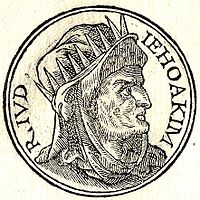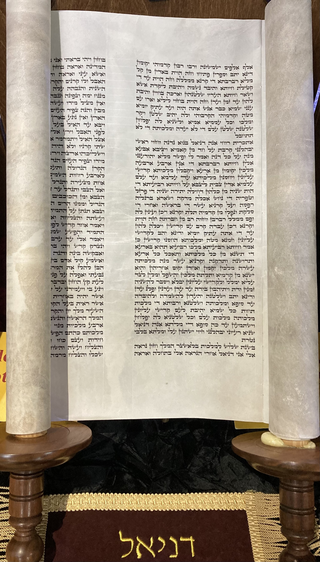
The Book of Daniel is a 2nd century BC biblical apocalypse with a 6th century BC setting. Ostensibly "an account of the activities and visions of Daniel, a noble Jew exiled at Babylon", the text features a prophecy rooted in Jewish history, as well as a portrayal of the end times that is both cosmic in scope and political in its focus. The message of the text intended for the original audience, was that just as the God of Israel saves Daniel from his enemies, so he would save the Israelites in their present oppression.
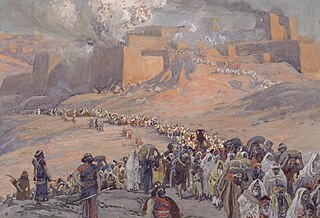
The Babylonian captivity or Babylonian exile was the period in Jewish history during which a large number of Judeans from the ancient Kingdom of Judah were forcibly relocated to Babylonia by the Neo-Babylonian Empire. The deportations occurred in multiple waves: After the siege of Jerusalem in 597 BCE, around 7,000 individuals were deported to Mesopotamia. Further deportations followed the destruction of Jerusalem and Solomon's Temple in 587 BCE.

Apocalypse is a literary genre originating in Judaism in the centuries following the Babylonian exile but persisting in Christianity and Islam. In it a supernatural being reveals cosmic mysteries or the future to a human intermediary. The means of mediation include dreams, visions and heavenly journeys, and they typically feature symbolic imagery drawn from the Jewish Bible, cosmological and (pessimistic) historical surveys, the division of time into periods, esoteric numerology, and claims of ecstasy and inspiration. Almost all are written under pseudonyms, claiming as author a venerated hero from previous centuries, as with the Book of Daniel, composed during the 2nd century BCE but bearing the name of the legendary Daniel from the 6th century BCE.

Belshazzar was the son and crown prince of Nabonidus, the last king of the Neo-Babylonian Empire. Through his mother, he might have been a grandson of Nebuchadnezzar II, though this is not certain and the claims to kinship with Nebuchadnezzar may have originated from royal propaganda.

Belshazzar's feast, or the story of the writing on the wall, chapter 5 in the Book of Daniel, tells how Belshazzar holds a great feast and drinks from the vessels that had been looted in the destruction of the First Temple. A hand appears and writes on the wall. The terrified Belshazzar calls for his wise men, but they are unable to read the writing. The queen advises him to send for Daniel, renowned for his wisdom. Daniel reminds Belshazzar that his father Nebuchadnezzar, when he became arrogant, was thrown down until he learned that God has sovereignty over the kingdom of men. Belshazzar had likewise blasphemed God, and so God sent this hand. Daniel then reads the message and interprets it: God has numbered Belshazzar's days, he has been weighed and found wanting, and his kingdom will be given to the Medes and the Persians.
That very night Belshazzar, the Chaldean [Babylonian] king, was killed. And Darius the Mede received the kingdom […]
The Prophecy of Seventy Weeks is the narrative in chapter 9 of the Book of Daniel in which Daniel prays to God to act on behalf of his people and city, and receives a detailed but cryptic prophecy of "seventy weeks" by the angel Gabriel. The prophecy has been the subject of "intense exegetical activity" since the Second Temple period. James Alan Montgomery referred to the history of this prophecy's interpretation as the "dismal swamp" of critical exegesis.

Darius the Mede is mentioned in the Book of Daniel as King of Babylon between Belshazzar and Cyrus the Great, but he is not known to secular history and there is no space in the historical timeline between those two verified rulers. Belshazzar, who is often mentioned as king in the book of Daniël, was in fact the crown-prince and governer while his father was in Arabia from ca. 553 tot 543 BCE, but Nabonidus had returned to Babylon years before the fall of the Babylonian empire.
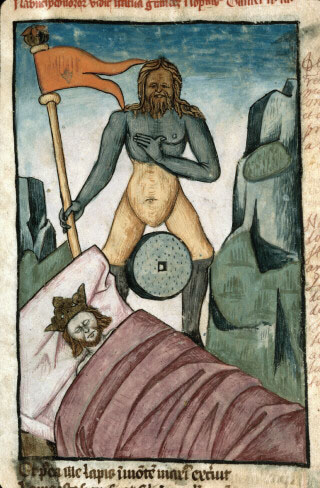
Daniel 2 tells how Daniel related and interpreted a dream of Nebuchadnezzar II, king of Babylon. In his night dream, the king saw a gigantic statue made of four metals, from its head of gold to its feet of mingled iron and clay; as he watched, a stone "not cut by human hands" destroyed the statue and became a mountain filling the whole world. Daniel explained to the king that the statue represented four successive kingdoms beginning with Babylon, while the stone and mountain signified a kingdom established by God which would never be destroyed nor given to another people. Nebuchadnezzar then acknowledges the supremacy of Daniel's God and raises him to high office in Babylon.
Daniel 7 tells of Daniel's vision of four world-kingdoms replaced by the kingdom of the saints or "holy ones" of the Most High, which will endure for ever. Four beasts come out of the sea, the Ancient of Days sits in judgment over them, and "one like a son of man" is given eternal kingship. An angelic guide interprets the beasts as kingdoms and kings, the last of whom will make war on the "holy ones" of God, but they will be destroyed and the "holy ones" will be given eternal dominion and power.
Daniel 8 is the eighth chapter of the Book of Daniel. It tells of Daniel's vision of a two-horned ram destroyed by a one-horned goat, followed by the history of the "little horn", which is Daniel's code-word for the Greek king Antiochus IV Epiphanes.

Shadrach, Meshach, and Abednego are figures from chapter 3 of the biblical Book of Daniel. In the narrative, the three Jewish men are thrown into a fiery furnace by Nebuchadnezzar II, King of Babylon for refusing to bow to the king's image. The three are preserved from harm and the king sees four men walking in the flames, "the fourth ... like a son of God". They are first mentioned in Daniel 1, where alongside Daniel they are brought to Babylon to study Chaldean language and literature with a view to serving at the King's court, and their Hebrew names are replaced with Chaldean or Babylonian names.
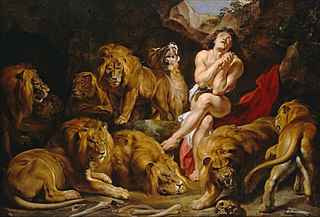
Daniel is the main character of the Book of Daniel. According to the Hebrew Bible, Daniel was a noble Jewish youth of Jerusalem taken into captivity by Nebuchadnezzar II of Babylon, serving the king and his successors with loyalty and ability until the time of the Persian conqueror Cyrus, all the while remaining true to the God of Israel. While some conservative scholars hold that Daniel existed and his book was written in the 6th century BCE, most scholars agree that Daniel is not a historical figure and that much of the book is a cryptic allusion to the reign of the 2nd century BCE Hellenistic king Antiochus IV Epiphanes.

The siege of Jerusalem was a military campaign carried out by Nebuchadnezzar II, king of the Neo-Babylonian Empire, in which he besieged Jerusalem, then capital of the Kingdom of Judah. The city surrendered, and its king Jeconiah was deported to Babylon and replaced by his Babylonian-appointed uncle, Zedekiah. The siege is recorded in both the Hebrew Bible and the Babylonian Nebuchadnezzar Chronicle.
Chapters 10, 11, and 12 in the Book of Daniel make up Daniel's final vision, describing a series of conflicts between the unnamed "King of the North" and "King of the South" leading to the "time of the end", when Israel will be vindicated and the dead raised, some to everlasting life and some to shame and everlasting contempt.

Daniel in the lions' den tells of how the biblical Daniel is saved from lions by the God of Israel "because I was found blameless before him". It parallels and complements chapter 3, the story of Shadrach, Meshach, and Abednego: each begins with the jealousy of non-Jews towards successful Jews and an imperial edict requiring them to compromise their religion, and concludes with divine deliverance and a king who confesses the greatness of the God of the Jews and issues an edict of royal protection. The tales making up chapters 1–6 of Daniel date no earlier than the Hellenistic period and were probably originally independent, but were collected in the mid-2nd century BC and expanded shortly afterwards with the visions of the later chapters to produce the modern book.

The Daniel Fast, in Christianity, is a partial fast, in which meat, dairy, alcohol, and other rich foods are avoided in favor of vegetables and water in order to be more sensitive to God. The fast is based on the lifelong kosher diet of the Jewish prophet Daniel in the biblical Book of Daniel and the three-week mourning fast in which Daniel abstained from all meat and wine. Among Catholic and Mainline Protestant Christians, the Daniel Fast has been practiced by some during the 40-day season of Lent, though the Daniel Fast can variously be set at three weeks, or even ten days. As such, evangelical Christian churches such as those of the Baptist tradition, have partaken in the fast at various times of the year. The passage in Chapter 1 refers to a 10-day test wherein Daniel and others with him were permitted to eat vegetables and water to avoid the Babylonian king's food and wine. After remaining healthy at the end of the 10-day period, they continued the vegetable diet for the three years of their education. The passage in Chapter 10 refers to a three-week fast of no meat, wine, or rich food. In addition to the practices of fasting and abstinence undertaken during the Daniel Fast, Christians may also add spiritual disciplines such as daily church attendance, increased prayer, as well as the reading of Sacred Scripture and a daily devotional.

Daniel 4, the fourth chapter of the Bible's Book of Daniel, is presented in the form of a letter from king Nebuchadnezzar II in which he learns a lesson of God's sovereignty, "who is able to bring low those who walk in pride". Nebuchadnezzar dreams of a great tree that shelters the whole world, but an angelic "watcher" appears and decrees that the tree must be cut down and that for seven years, he will have his human mind taken away and will eat grass like an ox. This comes to pass, and at the end of his punishment, Nebuchadnezzar praises God. Daniel's role is to interpret the dream for the king.

2 Kings 24 is the twenty-fourth chapter of the second part of the Books of Kings in the Hebrew Bible or the Second Book of Kings in the Old Testament of the Christian Bible. The book is a compilation of various annals recording the acts of the kings of Israel and Judah by a Deuteronomic compiler in the seventh century BCE, with a supplement added in the sixth century BCE. This chapter records the events during the reigns of Jehoiakim, Jehoiachin and Zedekiah, kings of Judah.

2 Chronicles 36 is the thirty-sixth chapter of the Second Book of Chronicles the Old Testament of the Christian Bible or of the second part of the Books of Chronicles in the Hebrew Bible. The book is compiled from older sources by an unknown person or group, designated by modern scholars as "the Chronicler", and had the final shape established in late fifth or fourth century BCE. This chapter belongs to the section focusing on the kingdom of Judah until its destruction by the Babylonians under Nebuchadnezzar and the beginning of restoration under Cyrus the Great of Persia. It contains the regnal accounts of the last four kings of Judah - Jehoahaz, Jehoiakim, Jehoiachin and Zedekiah - and the edict of Cyrus allowing the exiled Jews to return to Jerusalem.

Jeremiah 46 is the forty-sixth chapter of the Book of Jeremiah in the Hebrew Bible or the Old Testament of the Christian Bible. This book contains prophecies attributed to the prophet Jeremiah, and is one of the Books of the Prophets. This chapter is part of a series of "oracles against foreign nations", consisting of chapters 46 to 51. In particular, chapters 46-49 focus on Judah's neighbors. This chapter contains the poetic oracles against Egypt.


